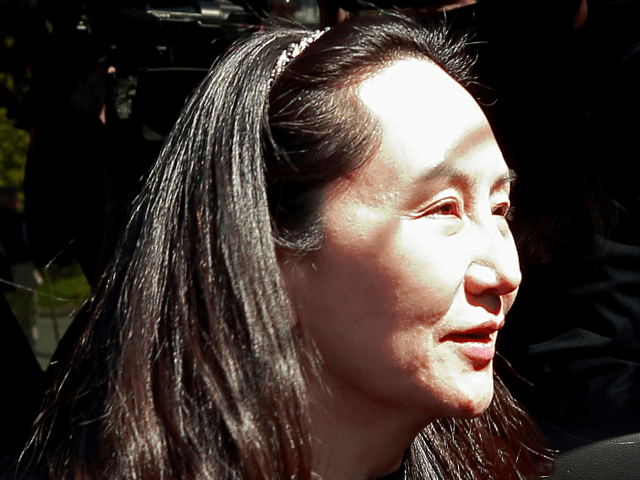Secretary of State Mike Pompeo promised Canadian Prime Minister Justin Trudeau on Thursday that the United States is working to secure the freedom of two Canadians held prisoner by Communist China. Pompeo stressed that Meng Wanzhou, an executive of China’s Huawei telecom company held by Canada for rendition to the U.S. to face fraud charges, will not be used as a bargaining chip in the American trade war with China. China, meanwhile, ordered Canada to release Meng if it wants relations with Beijing to improve in any meaningful way.
Pompeo made his remarks while meeting with Trudeau in Ottawa on Thursday. Trudeau said he and Pompeo had “a lot to discuss just ahead of the G7, lots of global issues,” including “the plight of the two Canadians in China.”
This was a reference to Michael Kovrig and Michael Spavor, who were seized by the Chinese in December 2018 on nebulous grounds in an apparent act of retaliation for Canada’s arrest of Meng Wanzhou. After holding the men for months without much in the way of justification the Chinese announced, right after Meng’s extradition hearing in March 2019, that Kovrig and Spavor were accused of working together in a spy ring.
“Please do know that our team is focused on helping those two Canadians be released,” Pompeo told Trudeau. “China needs to honor the commitments it’s made to the world, and it’s our expectation they’ll do so. And we’re working on that diligently. It’s time to bring them home.”
Canadian Foreign Minister Chrystia Freeland also thanked Pompeo for American assistance with the Kovrig and Spavor cases when she met with him on Thursday.
“I think it’s worth pointing out, maybe especially to our American visitors, that a great number of Canada’s allies around the world have spoken out against these arbitrary detentions, and we thank all of those allies as well,” Freeland added, citing the example of German Foreign Minister Heiko Maas raising the issue during his recent visit to Canada.
Freeland stressed that Meng Wanzhou’s extradition would not be influenced by political considerations, saying:
When it comes to the extradition request from the United States of Ms. Meng, Canada and the United States have an extradition treaty, which has been in place for a long time – not quite longer than I have been alive, but pretty close. Our border is the longest un-militarized border in the world. And as Mike and I have both emphasized, there is – we just do a lot of business. A lot of stuff happens across that border, and we need to have an extradition treaty in place for both of our countries to function well and for that border to work.
When it comes to Canada applying our extradition treaty with the United States, it’s not a political decision. The application of the extradition treaty is done under delegated authority by Canadian public servants, and that is as it ought to be. Extradition is a criminal justice matter; it is not a political matter.
And the case of Ms. Meng is currently before the Canadian courts, as it ought to be. As for the U.S. case against Ms. Meng, I think that’s a matter for the U.S. and the U.S. criminal justice authorities.
Pompeo was irked at reporter Lara Jakes of the New York Times, who asked Freeland if Canada has requested the U.S. drop its extradition demand against Meng to placate China and secure the freedom of Kovrig and Spavor. Pompeo said the question “took the Chinese line” by linking Meng’s case with those of the two captive Canadians, and continued:
The arbitrary detention of two Canadian citizens in China is fundamentally different as a human rights matter, as a rule of law matter. These are fundamentally different matters than the Canadian decision to use their due process and the rule of law to behave in a way that’s deeply consistent with the way decent nations work. And so when you ask this question, you connect them up. That’s what China wants to talk about. They want to talk about these two as if they are equivalent, as if they’re morally similar, which they fundamentally are not.
Asked directly if the U.S. regards Meng as a “bargaining chip” in its trade war with China, Pompeo replied: “No.”
“It is a legal process by the United States Department of Justice designed to bring someone who we believe we have sufficient information to bring back to the United States under the agreements between the United States and Canada – very straightforward,” he elaborated.
The Chinese embassy to Canada said on Thursday that Canada is solely responsible for the deterioration of relations between the two countries and ordered the Canadians to release Meng if they want those relations to improve.
“China-Canada relations now suffer gross difficulties and the Canadian side knows very well the root cause,” the embassy sneered. “Canada should release Ms. Meng Wanzhou immediately and ensure her safe return to China, and bring bilateral relations back onto the right track.”
The BBC on Thursday reported Canada has suspended travel to China for employees of its consulate in Hong Kong, fearing that more of them could be extra-judicially kidnapped like Kovrig, Spavor, and more recently Hong Kong consular official Simon Cheng Man-kit, who disappeared while attending a business event on the mainland two weeks ago.
After holding Cheng without charges or officially acknowledging his arrest for days, the Chinese Ministry of Foreign Affairs finally acknowledged he was a prisoner on Wednesday but still refused to say why. On Thursday, Chinese state media claimed he was arrested for soliciting a prostitute.

COMMENTS
Please let us know if you're having issues with commenting.